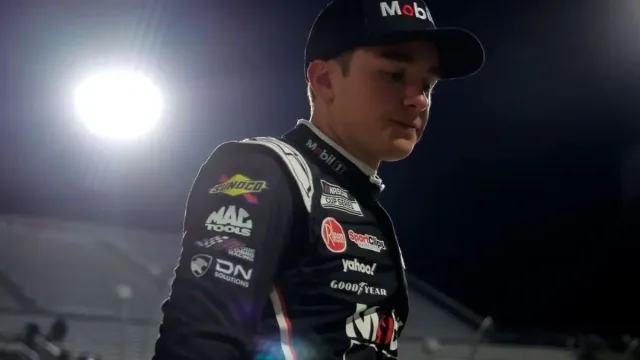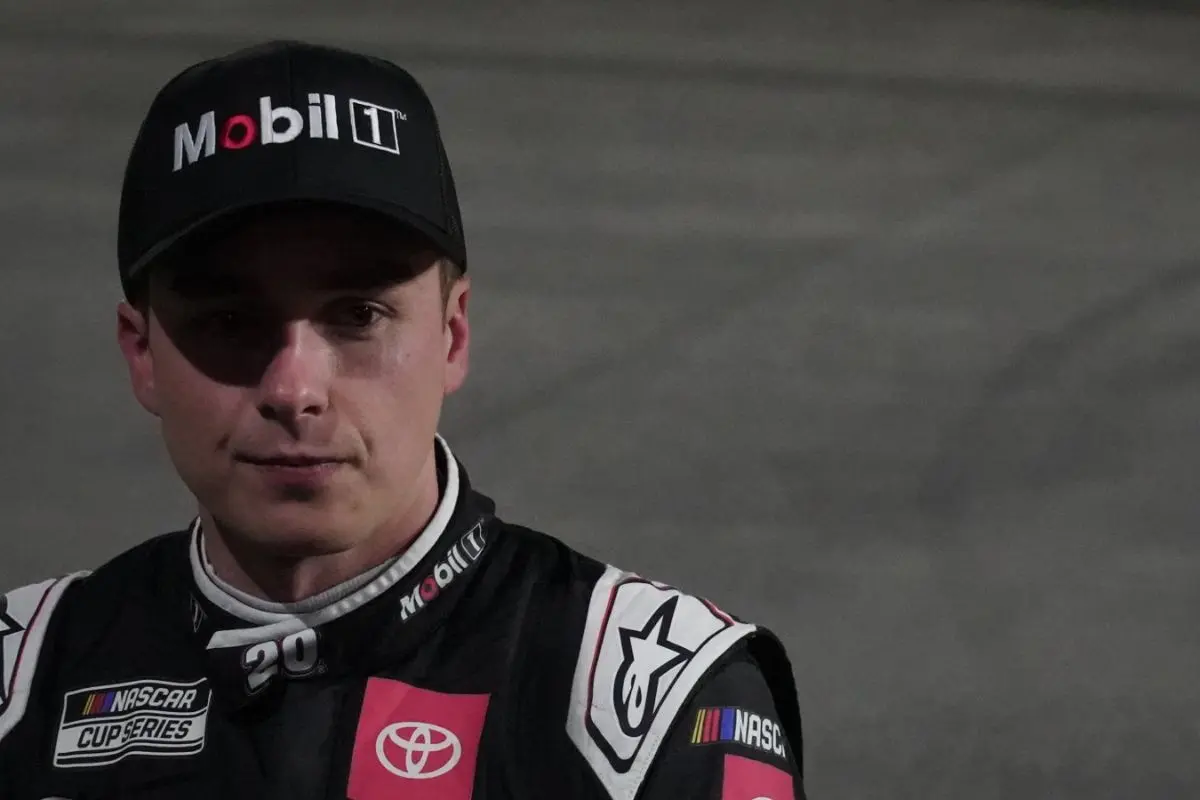Christopher Bell Feels ‘Cheated’: Christopher Bell has voiced his deep discontent regarding perceived manipulation by chevrolet/”>Chevrolet, alleging that the last-lap crash that cost him a shot at the NASCAR Championship 4 was a calculated act rather than an accident. He feels cheated and betrayed by a system that seemingly favored larger teams and OEMs, questioning the integrity of NASCAR’s competitive landscape.
Key Highlights
- Christopher Bell was disqualified from the NASCAR Championship 4 due to a safety violation after his impressive ‘Hail Melon 2.0’ maneuver at Martinsville Speedway.
- He claims the last-lap crash was a calculated maneuver orchestrated by Chevrolet, not just an accident.
- Bell expressed feelings of betrayal, believing he was cheated out of a championship opportunity due to external manipulation.
- NASCAR penalized the #23 team for their involvement in race manipulation, raising concerns about competition integrity.
- Ongoing discussions about NASCAR’s regulatory framework and OEM influence reflect the need to address fairness and team dynamics in the sport.
Christopher Bell’s Disqualification from the Championship 4
Christopher Bell’s disqualification from the Championship 4 has sparked considerable debate within the NASCAR community, highlighting the complexities of race tactics and the implications of regulatory decisions. The circumstances surrounding his exclusion stem from a safety violation, which overshadowed his remarkable maneuver at Martinsville Speedway—an audacious ‘Hail Melon 2.0’ that temporarily secured his place among the final contenders.
However, the situation becomes more intricate when juxtaposed with the tactical alliances among the Chevrolet drivers, particularly between Ross Chastain and Austin Dillon. Their coordinated efforts to defend William Byron during the concluding laps of the race showcased race manipulation tactics that Bell’s team could not match. This dynamic raises questions about the integrity of competition and the extent to which team tactics can influence individual outcomes.
Despite Bell’s commendable performance throughout the 2024 season, his disqualification demonstrates the harsh realities of NASCAR’s regulatory framework. The decision not only curtailed his championship aspirations but also illuminated the broader implications for teams steering through the fine line between aggressive tactics and compliance with regulations.
As Bell and his supporters express sentiments of being ‘cheated’, it invites examination into the decision-making processes within NASCAR. The complexities of race tactics, team dynamics, and regulatory enforcement create a multifaceted narrative that challenges the traditional understanding of competitive fairness in motorsports, leaving an indelible mark on the ongoing discourse surrounding NASCAR’s integrity.
Penalties and NASCAR’s Response
The fallout from Christopher Bell’s disqualification has prompted a crucial examination of NASCAR’s penalty structure and its effectiveness in maintaining competitive integrity. Following the incident, NASCAR’s response included noteworthy ejections and fines aimed at teams and drivers involved.
However, many observers argue that these measures may not be sufficient or appropriately calibrated, as they fail to address the underlying issues of perceived manipulation and fairness in competition.
Several key points emerge from this situation:
- Erosion of Trust: With allegations of race manipulation, fans and drivers alike may begin to question the legitimacy of the sport, undermining the trust that is fundamental to its success.
- Inconsistent Enforcement: NASCAR’s handling of penalties has often been scrutinized for inconsistency. The contrast between Bell’s disqualification and the apparent leniency shown to others raises concerns about the fairness of their enforcement practices.
- Impact on Championship Dynamics: The situation has notable implications for championship standings, as the outcomes of races directly affect playoff qualifications. A more transparent and standardized approach to penalties could help mitigate these concerns.
As NASCAR navigates this complex landscape, the need for a more cohesive penalty framework becomes crucial. Ensuring that all teams are held to the same standards is vital for preserving the integrity of the sport and maintaining the faith of its participants and fans alike.
Christopher Bell’s Frustration and Claims of Manipulation
Frustration permeates the air as Christopher Bell voices serious allegations regarding the integrity of the last lap in a recent race, suggesting that external manipulation played a pivotal role in the outcome.
Bell asserts that the sequence of events leading to his crash was not merely an unfortunate racing incident but rather a calculated maneuver orchestrated by Chevrolet. His claim hinges on the belief that the dynamics of the race were skewed, forcing drivers, including himself and Bubba Wallace, into unstable positions.
In an interview, Bell articulated his sense of betrayal, stating, “I feel cheated out of a chance to compete for the championship.” He traced the root of his grievance to the laps preceding the dramatic finale, contending that decisions made by Chevrolet effectively dictated the actions of drivers on the track.
“I feel cheated out of a chance to compete for the championship. It all stems from what happened with 15-20 to go whenever the race got fixed and manipulated by Chevrolet that forced our hands to do what we did, and ultimately it forced me into a mistake on the last lap to get into the wall.” – Christopher Bell
Christopher Bell says he felt cheated and he should be in the Champ 4 after what he viewed as race manipulation by the Chevrolets, which he indicated was the reason Bubba Wallace fell back and the result of the actions of the final lap. pic.twitter.com/BS0u8nmz3A
— Bob Pockrass (@bobpockrass) November 9, 2024
Bell’s misstep, he argues, can be attributed to the manipulation he claims was at play, leading to his wall contact that ultimately dashed his championship hopes.
While NASCAR did penalize the #23 team for their role in what they deemed race manipulation, Bell’s narrative highlights a perceived inequity in the competitive landscape.
As the #24 car advanced to the Championship 4, aided by teammates from Chevy, the implications of Bell’s claims may reverberate long after the race, prompting a deeper examination of team dynamics and the sanctity of the sport.
Christopher Bell’s Perspective on Chevrolet Team Support
Manipulation allegations aside, Bell’s reflections on the role of Chevrolet’s team support highlight the intricate dynamics of NASCAR racing. His assertion that the backing from two Chevy cars played a critical role in the outcome of the race reveals a nuanced understanding of how OEM partnerships can influence competitive scenarios.
“I feel like I should be in the championship 4 yes. In the race, when manipulation happened, it was clear that I needed a position, and with the 23 dropping back, we got that position. Whenever we crossed the finish line, the 20 car was in. With the cars that were dealt, the 20 car was in position to make the championship event, and we’re not in it.” – Christopher Bell
Bell feels that without this collective support, he would have secured a position in the championship finale, underscoring the interconnected nature of team strategies within the sport.
The implications of Bell’s perspective can be broken down into three key aspects:
- Collective Strategy: The collaboration between drivers on the same manufacturer team can create advantageous racing conditions, allowing for strategies that enhance each other’s standings during critical moments of a race.
- Position Dynamics: Bell’s claim that the positioning of the 23 car affected his own opportunities demonstrates how individual performances are often contingent upon the actions of teammates, thereby complicating personal accountability in race outcomes.
- Impact on Championship Aspirations: Bell’s contention that he should be in the championship four highlights the high stakes of these alliances, where the manipulation of race conditions can directly affect a driver’s career path and potential for success.
OEM Influence in NASCAR and Keselowski’s Perspective
In the competitive arena of NASCAR, the influence of Original Equipment Manufacturers (OEMs) has become a defining factor in shaping team strategies and race outcomes. The relationship between OEMs and teams is intricate, as highlighted by Denny Hamlin’s podcast revelations regarding Chevy’s specialized partnerships.
Unlike the more equitable collaboration seen with 23XI Racing and Joe Gibbs Racing, Chevrolet’s support heavily favors Hendrick Motorsports, empowering them with superior resources and capabilities. This dynamic creates a hierarchy where teams like Trackhouse Racing and RCR must align themselves closely with Hendrick to secure access to crucial developmental tools and performance improvements.
Brad Keselowski’s insights further illuminate this OEM advantage, emphasizing the pressure smaller teams face in attempting to achieve competitiveness. He posits that the current landscape of Next-Gen racing has amplified OEM influence, where obligations and perceived threats from manufacturers can dictate team operations and strategies.
“The OEMs have never had more leverage than they have today in this sport, and when they have the leverage, they’re gonna wield it. I think the teams feel those obligations, sometimes even threats from manufacturers, and it’s made its way to now where you guys see it, where the fans see it. I suspect they’ll continue to grow unless they get checked.” – Brad Keselowski
Brad Keselowski on why manufacturers have so much influence and what he saw and was thinking during the final laps at Martinsville. pic.twitter.com/KV51eraBUk
— Bob Pockrass (@bobpockrass) November 9, 2024
As NASCAR contemplates revising its rulebook to impose penalties on OEMs for manipulative behaviors, the sport stands at a crossroads. The potential for regulatory changes could either rein in the OEMs’ dominance or inadvertently entrench their influence further.
The unfolding narrative of OEM involvement in NASCAR raises critical questions about fairness, equity, and the integrity of competition, ultimately shaping the future of the sport. As Keselowski suggests, without intervention, the advantage wielded by OEMs may continue to grow, challenging the very core of competitive racing.
News in Brief: Christopher Bell Feels ‘Cheated’
Christopher Bell’s allegations of manipulation highlight a growing concern regarding the integrity of competition within NASCAR. The interplay between manufacturer influence and race outcomes raises critical questions about fairness and transparency in the sport.
As stakeholders examine the implications of such claims, it becomes imperative to address the potential for conflicts of interest and their impact on drivers’ performances. Ensuring equitable conditions for all competitors is vital to maintaining the credibility of NASCAR as a premier racing organization.
ALSO READ: Christopher Bell on Revenge Mission at Phoenix, Insider Claims



